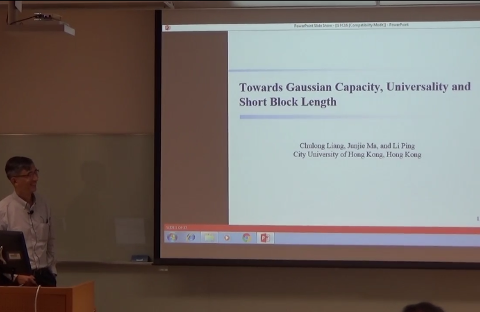
Forward error control (FEC) codes based on turbo, low-density parity-check (LDPC) and polar principles provide practical approaches towards channel capacity. There are, however, remaining challenges. Some of these are listed below.
• How to achieve performance with Gaussian signaling?
• How to design codes that are universally good over different channel conditions?
• How to reduce code length while maintain good performance?
In this talk, we introduce a spatially-coupled compressed FEC (SCC-FEC) coding scheme based on the recent progresses on the spatial coupling and compressed-sensing principles. We will show that SCC-FEC codes can be applied to the above mentioned difficulties.
Based on potential function analysis, we proved that SCC-FEC codes can asymptotically and universally achieve Gaussian capacity. We verified this by both evolution analysis and simulation. We also investigated multi-user SCC-FEC systems with short coding length per user. We observed noticeably improved performance compared with conventional LDPC codes with similar coding length. This reveals an interesting solution to the latency problem of modern codes.
Prof. LI Ping received his Ph.D. degree at Glasgow University in 1990. He lectured at Department of Electronic Engineering, Melbourne University, from 1990 to 1992, and worked as a research staff at Telecom Australia Research Laboratories from 1993 to 1995. Since January 1996, he has been with the Department of Electronic Engineering, City University of Hong Kong, where he is now a professor of information engineering. Prof. LI Ping received the IEE J J Thomson premium in 1993, the Croucher Foundation Award in 2005 and a British Royal Academy of Engineering Distinguished Visiting Fellowship in 2010. He served as a member of the Board of Governors for IEEE Information Theory Society from 2010 to 2012 and he is a fellow of IEEE.
